News & Events
Latest News
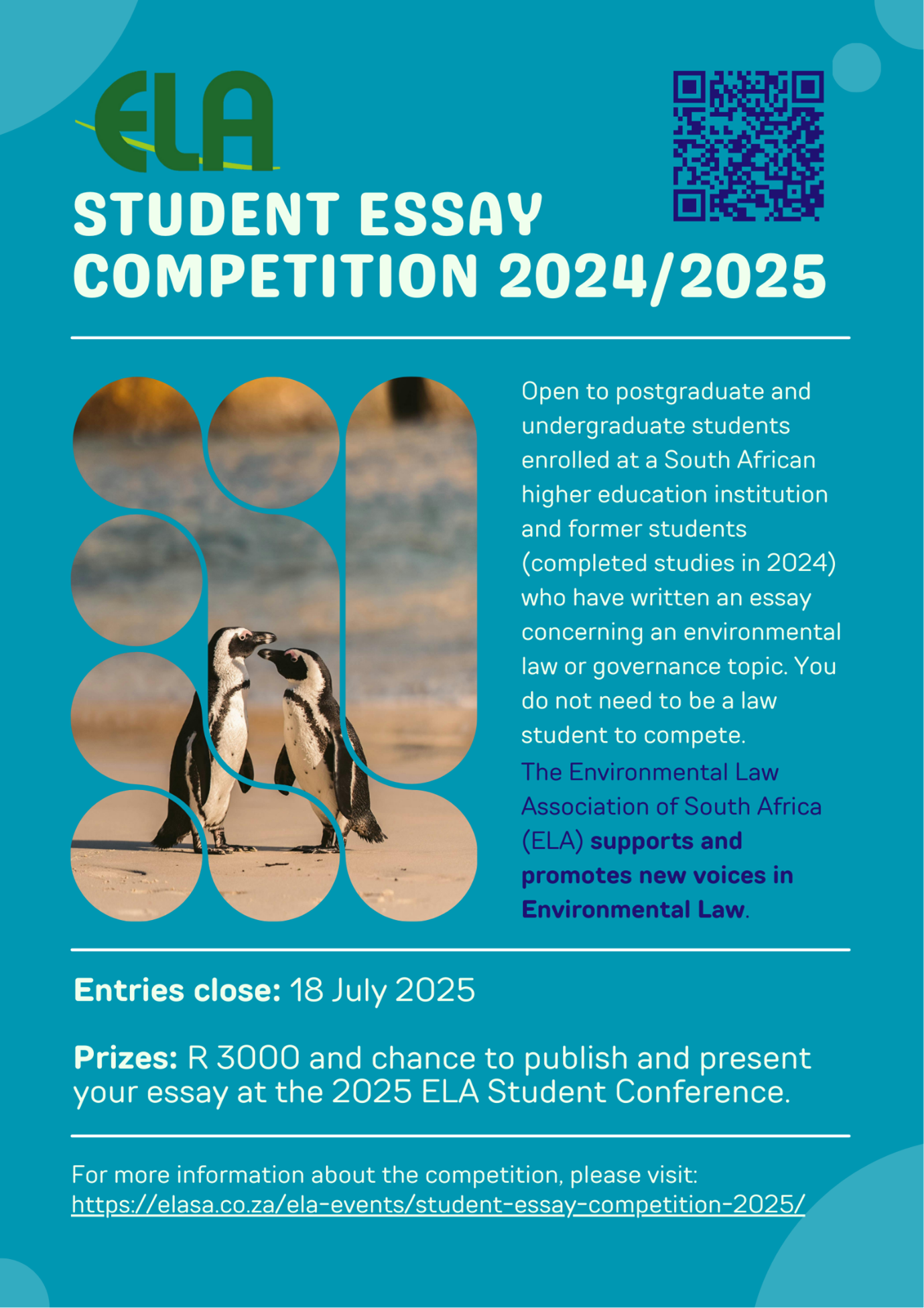 ELA STUDENT ESSAY COMPETITION 2024/2025
ELA STUDENT ESSAY COMPETITION 2024/2025  Environmental Law Experts Convened at the University of Venda for Student and Annual ELA Conference
Environmental Law Experts Convened at the University of Venda for Student and Annual ELA Conference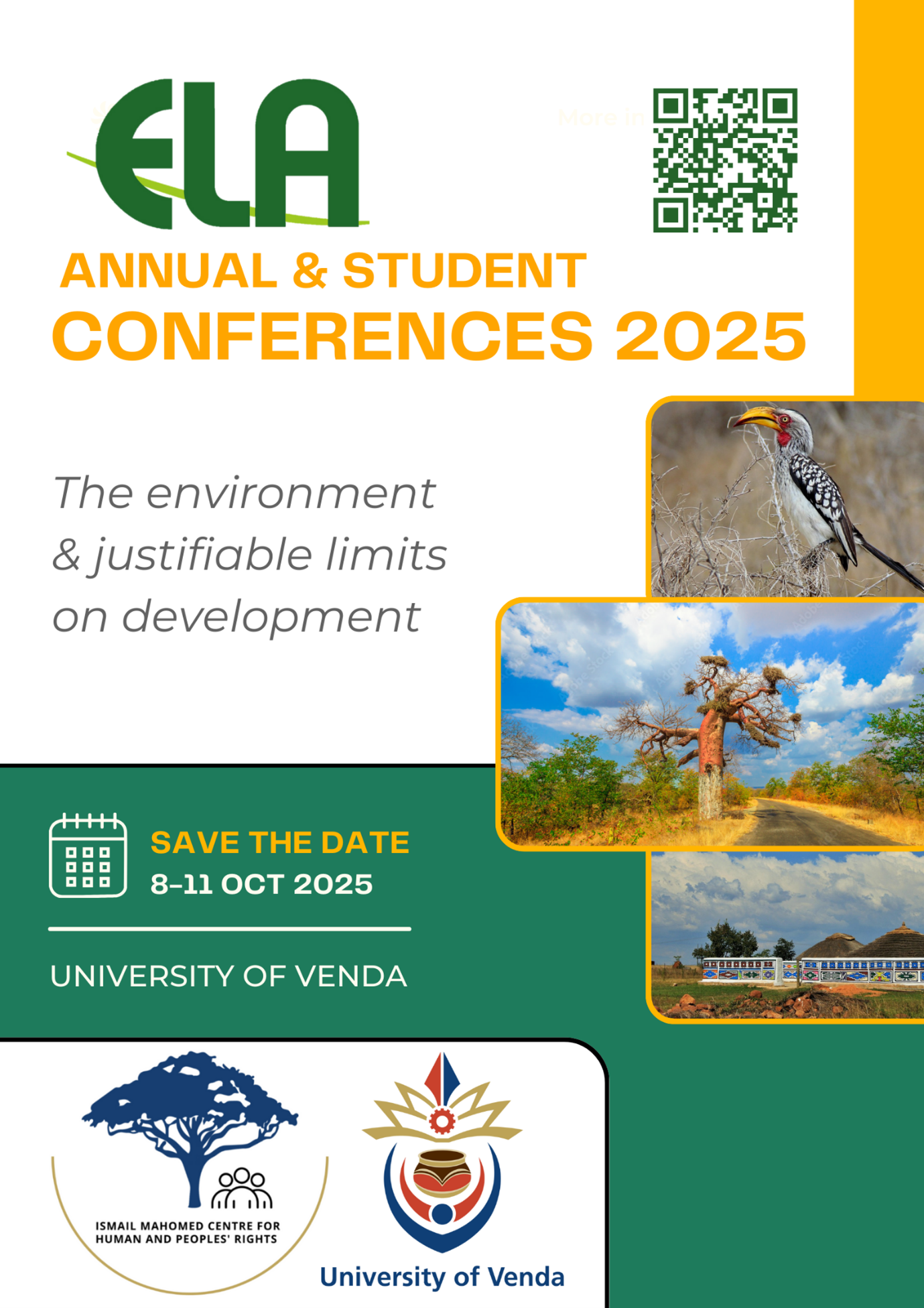 ELA ANNUAL & STUDENT CONFERENCES 2025. The environment and Justifiable limits on development
ELA ANNUAL & STUDENT CONFERENCES 2025. The environment and Justifiable limits on development 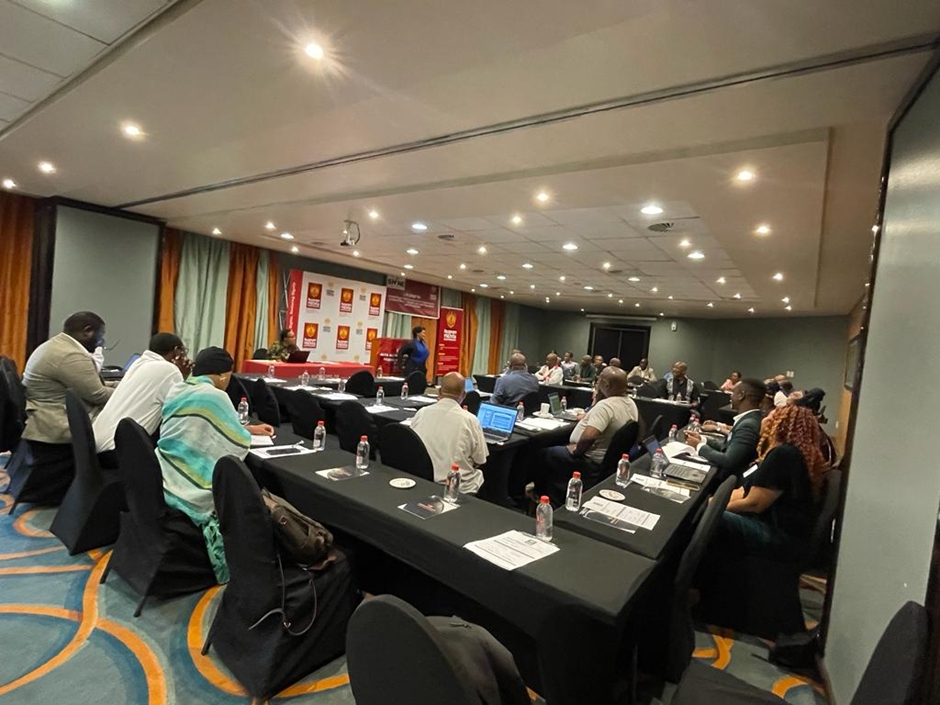 Prof Ademola Jegede gives an introductory speech commemorating the National Human Rights Day 2025
Prof Ademola Jegede gives an introductory speech commemorating the National Human Rights Day 2025 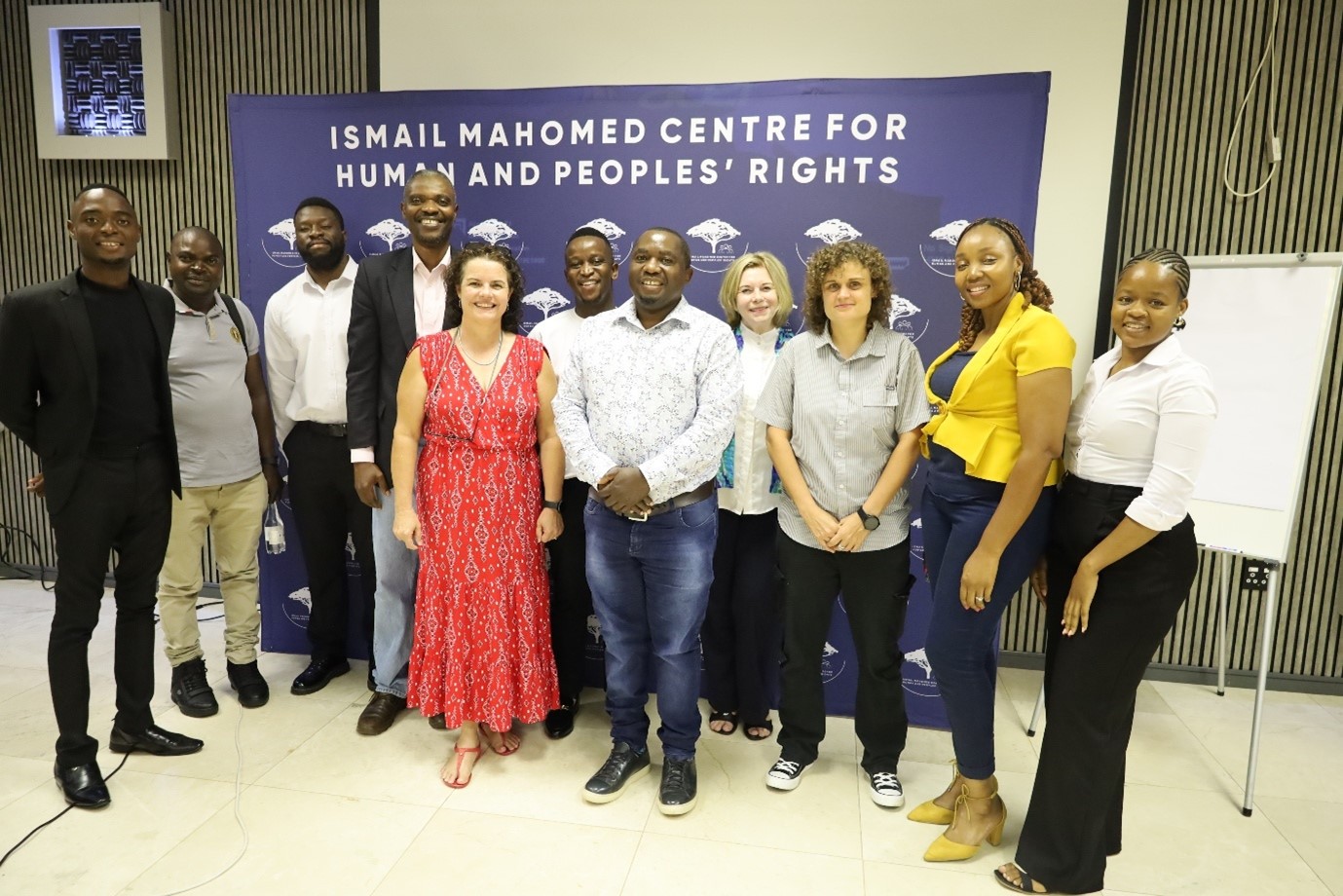 The IMCHPR Charts Course for 2025 with Diverse Stakeholder Input 4
The IMCHPR Charts Course for 2025 with Diverse Stakeholder Input 4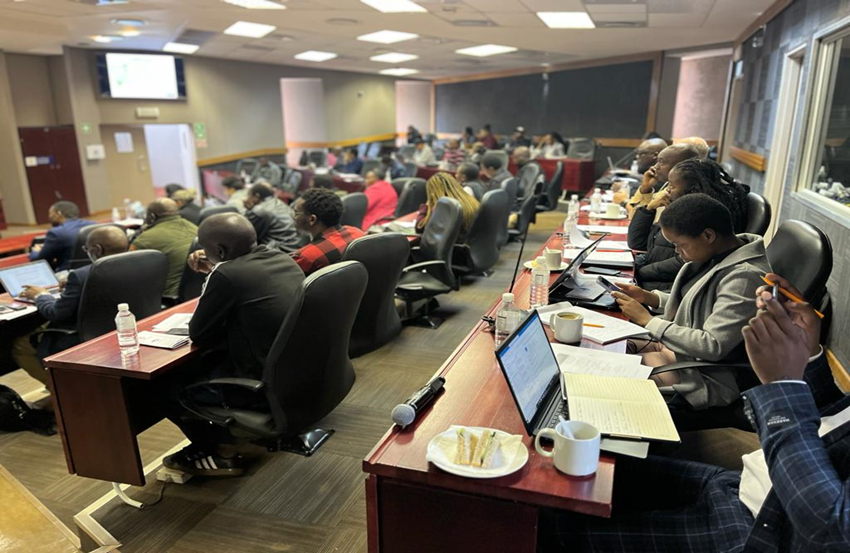 The IMCHPR Joins The South African Human Rights Commission In A Dialogue On Mining The Impact Of Mining Activities On Human Rights & The Protective Role Of Traditional Leaders
The IMCHPR Joins The South African Human Rights Commission In A Dialogue On Mining The Impact Of Mining Activities On Human Rights & The Protective Role Of Traditional Leaders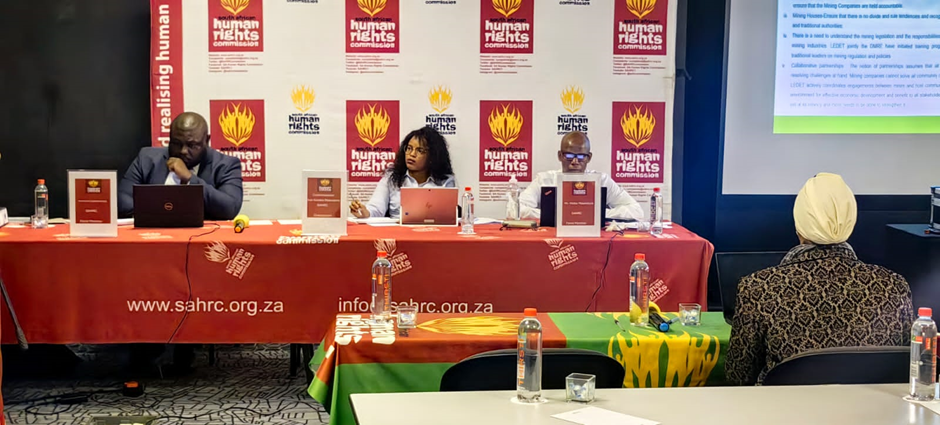 The IMCHPR presents submissions at the SAHRC Enquiry into the violations of human rights of mining communities in Limpopo Province.
The IMCHPR presents submissions at the SAHRC Enquiry into the violations of human rights of mining communities in Limpopo Province. 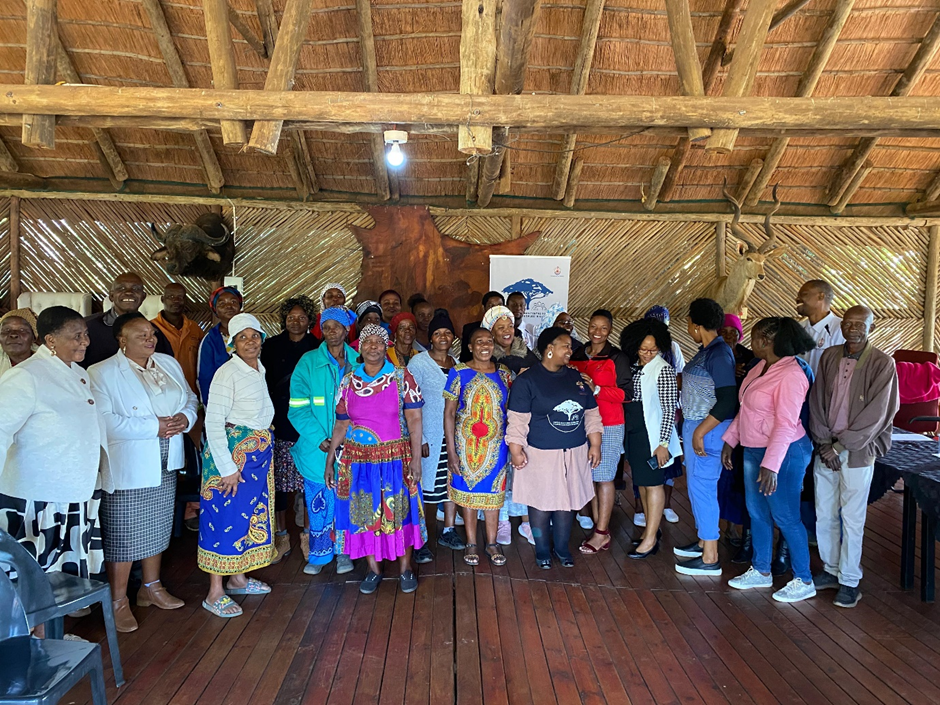 Ismail Mahomed Centre For Human And Peoples’ Rights Report On The Commemoration Of International Widow’s Day At Mhinga Community
Ismail Mahomed Centre For Human And Peoples’ Rights Report On The Commemoration Of International Widow’s Day At Mhinga Community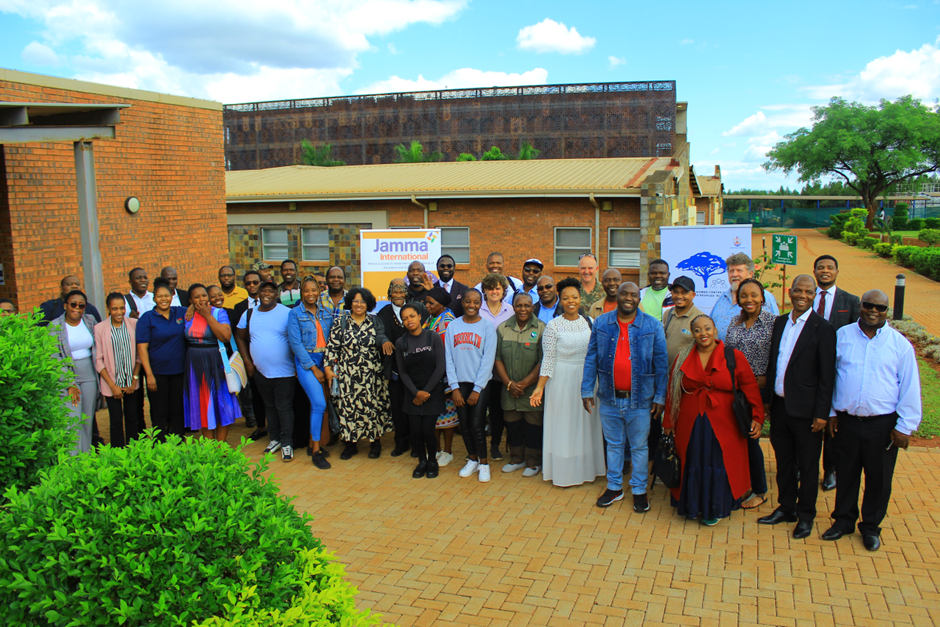 The IMCHPR Hosts a Roundtable discussion in collaboration with JAMMA International to discuss the sustainable use of wildlife as it impacts the rights of IPLP in southern Africa.
The IMCHPR Hosts a Roundtable discussion in collaboration with JAMMA International to discuss the sustainable use of wildlife as it impacts the rights of IPLP in southern Africa. Ismail Mahomed Centre for Human and Peoples’ Rights participated at SAHRC Stakeholders’ meetings
Ismail Mahomed Centre for Human and Peoples’ Rights participated at SAHRC Stakeholders’ meetings 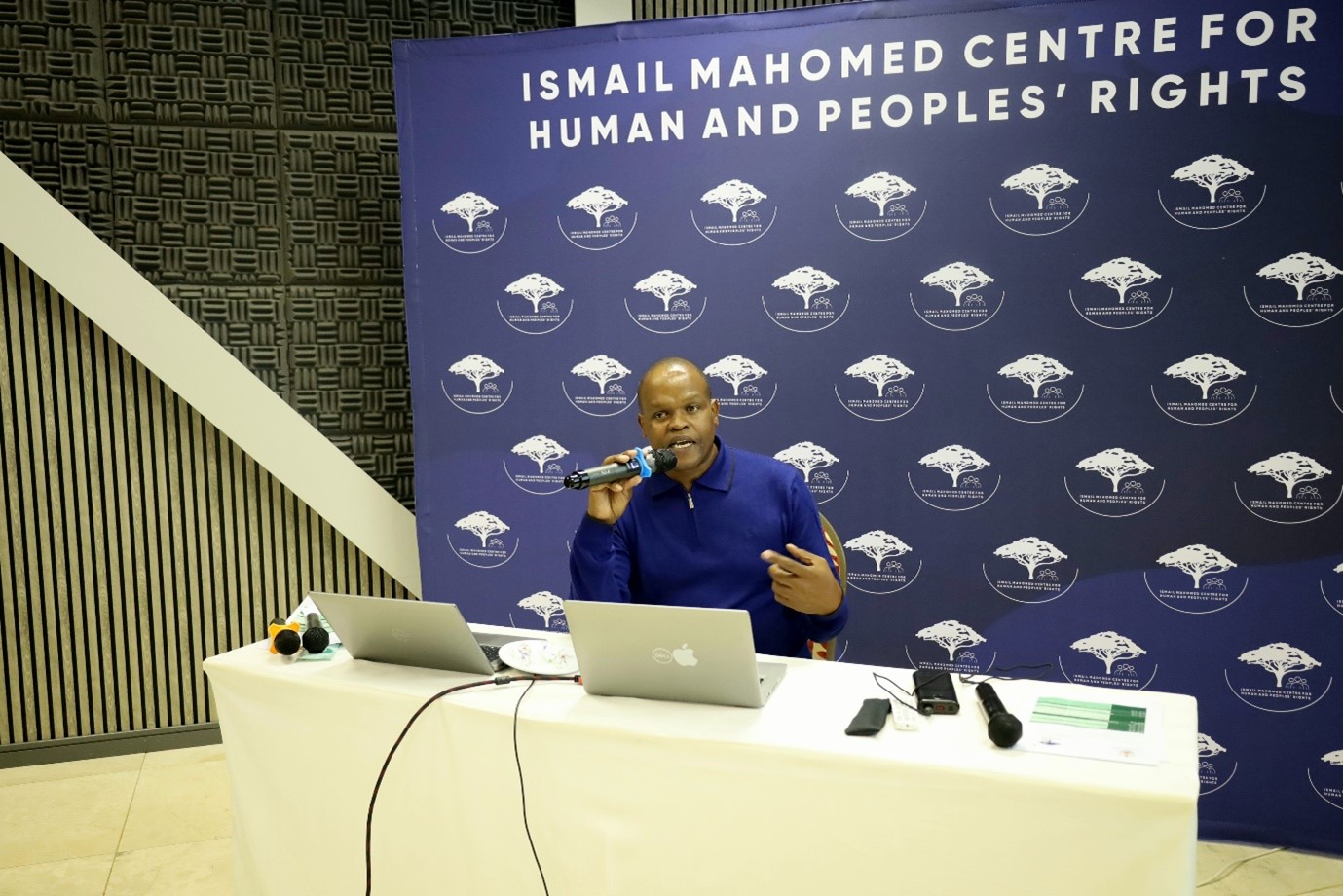 Ismail Mahomed Centre for Human and Peoples Rights (IMCHPR) commemorates the International Women’s Day themed: innovation and technology for gender equality
Ismail Mahomed Centre for Human and Peoples Rights (IMCHPR) commemorates the International Women’s Day themed: innovation and technology for gender equality IMCHPR mandate as the focus of MOU between UNIVEN and SAHRC
IMCHPR mandate as the focus of MOU between UNIVEN and SAHRC IMCHPR is the secretariat for implementing UNIVEN/ JAMMA International MOU
IMCHPR is the secretariat for implementing UNIVEN/ JAMMA International MOU
ELA STUDENT ESSAY COMPETITION 2024/2025

Open to postgraduate and undergraduate students enrolled at a South African higher education institution and former students (completed studies in 2024) who have written an essay concerning an environmental law or governance topic. You do not need to be a law student to compete.
The Environmental Law Association of South Africa (ELA) supports and promotes new voices in Environmental Law.
Entries close: 18 July 2025
Prizes: R3000 and chance to publish and present your essay at the 2025 ELA Student Conference.
For more information about the competition, please visit: https://elasa.co.za/ela-events/student-essay-competition-2025/
Environmental Law Experts Convened at the University of Venda for Student and Annual ELA Conference
The Ismail Mahomed Centre for Human and Peoples’ Rights (IMCHPR) of the Faculty of Management, Commerce and Law hosted the Environmental Law Association (ELA) of South Africa Conference from 08-10 October 2025 at the Research Conference Centre, University of Venda. This event, themed: The Environment and Justifiable Limits on Development (Mupo na Mikano i Tendeleaho kha Mveledziso), brought together university representatives, scholars, legal practitioners, civil society, and government entities to engage in critical issues in environmental law and governance. Representatives from eleven (11) universities in South Africa, namely, Nelson Mandela University, North-West University, Stellenbosch University, University of Cape Town, University of KwaZulu- Natal, University of Western Cape, University of Witwatersrand, University of Pretoria, University of South Africa, University of Venda and University of Zululand presented papers at the Conference. Also, entities such as Norton Rose Fulbright, Centre for Environmental Rights, Midlands State University (Zimbabwe), Johannesburg Bar, Public Service Coordinating Bargaining Council, South African Human Rights Commission, Danish Institute for Human Rights, Dauphine Université Paris, Juta Publishers, and Dzomo la Mupo contributed substantially to the eventful conference. The conference aimed to address pressing concerns such as climate change, biodiversity protection, sustainable development, and environmental justice, fostering dialogue and collaboration across sectors.
Professor Ademola Oluborode Jegede, Director of Ismail Mahomed Centre for Human and Peoples’ Rights
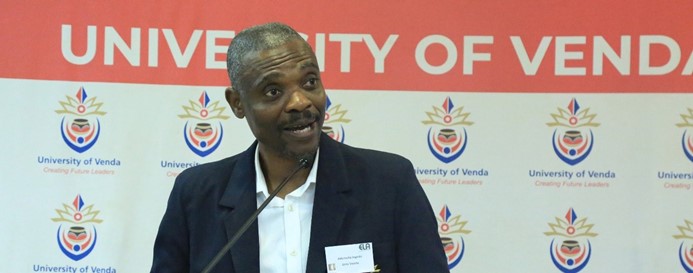
In his opening address, Professor Jegede noted that this conference followed the groundbreaking Memorandum of Association made between UNIVEN and ELA. He observed that ‘we live in a challenging and, at the same time, interesting time of triple planetary crises, where other disciplines and walks of life earnestly and continually wait on the response that the legal field has to offer.’ Yet, environmental law as a subject and its practitioners are fraught with challenges. In his view, it is urgent to save the field from neglect, as it is needed in local, regional and international lives in response to challenges such as climate change denialism, anti-environmentalism and environmental racism. He concluded that students, emerging scholars and experts offer the hope that the future is bright. He then thanked the organising team, especially Dr Melanie Murcott, Chairperson of ELA South Africa, for her support in making the event a reality.
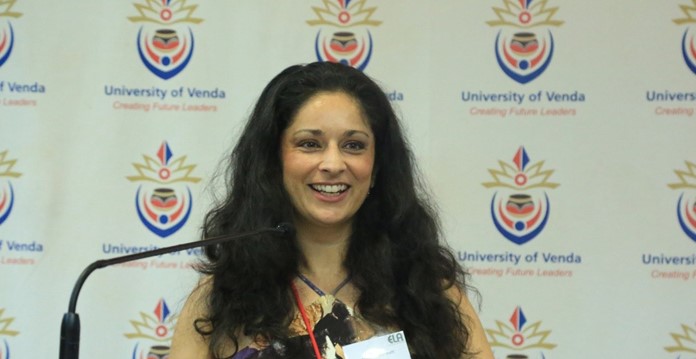
Dr Melanie Murcott, Chairperson of the Environmental Law Association of South Africa
Following the introduction, Dr Murcott introduced the guest and highlighted the diversity of participants from universities and other entities. She described careers and opportunities in the environmental law field. She advised students to use their skills, such as research, communication, and indigenous knowledge, to make a difference.
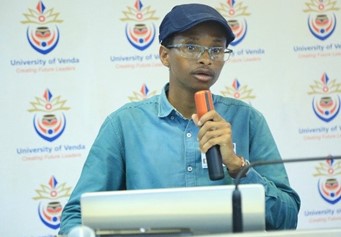
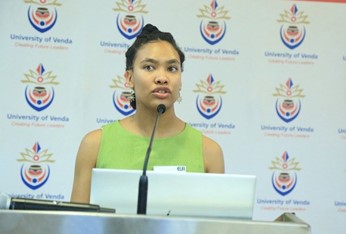
Presenters
The programme featured a series of sessions with presentations from various institutions, each offering knowledge exchange, fresh perspectives on environmental challenges and solutions relevant to South African communities. These sessions are: Towards environmental justice for South African communities chaired by Professor Oliver Fuo from North-West University; and Novel Approaches to Biodiversity Conservation, led by Megan Donald from the Danish Institute for Human Rights; Tackling energy security and justice, chaired by Nonhlanhla Ngcobo of North- West University; Ecological perspectives on environmental governance led by Emily Barritt from Dauphine Université Paris – PSL; improving environmental governance in cities, chaired by Wendy Muzangaza, North West University; and Innovative approaches to preventing and controlling environmental harms, North-West University.
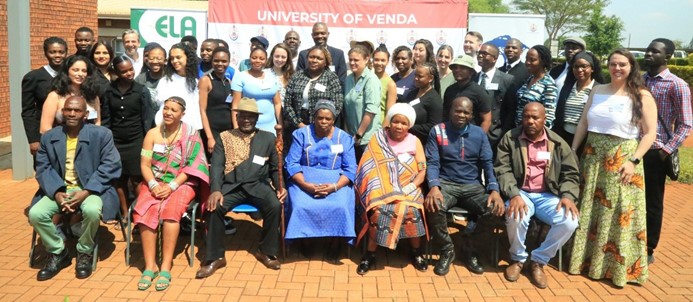
Group photo of some of the attendees
The student conference programme concluded with a prize-giving ceremony sponsored by Juta Publishers, celebrating outstanding student presenters and essay competition winners.
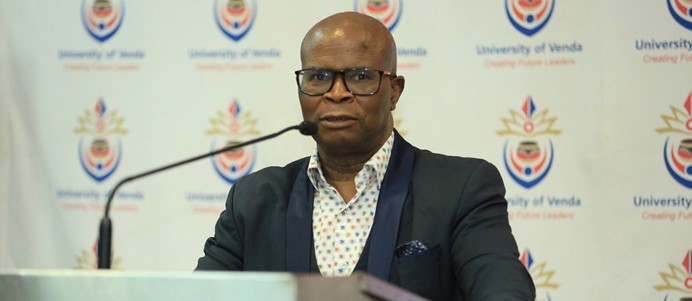
Professor Modimowabarwa Kanyane, Executive Dean, Faculty of Management, Commerce and Law, University of Venda
Building on the momentum of the programme of Day 1, Prof Kanyane officially opened the Annual ELA on Day 2. The official opening followed an excursion by participants to the Vuthanda Sacred Place, where they participated in a traditional engagement with the local Chief, an experiential ceremony honouring the land and indigenous heritage, setting a reflective tone for the days ahead. The formal conference, which featured the first keynote speaker, Vho Mphatheleni Makaulule, Founder and Executive Director of Dzomo la Mupo, was chaired by Professor Jegede.
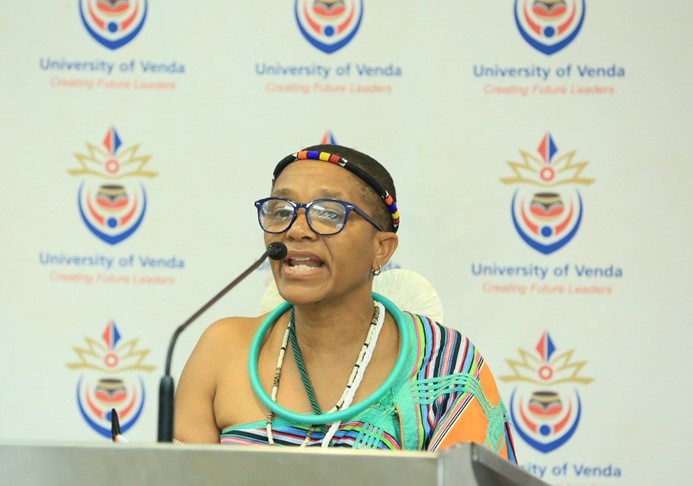
Vho Mphatheleni Makaulule, Founder and Executive Director of Dzomo la Mupo
Vho Makaulule delivered a deeply rooted and provocative address on the role of indigenous knowledge in achieving environmental justice. Speaking on behalf of her community-based organisation and allied eco-rights movements, she honoured the female elders and custodians of culture. Her message centred on the sacredness of indigenous life systems, which she described as ancient wisdom passed down through generations, not taught in classrooms, but lived through intergenerational learning. She emphasised that true development and environmental protection must respect indigenous boundaries, languages, and ecosystems, especially sacred forests, rivers, wetlands, and traditional agricultural practices. Her speech was a call to action: to honour the Miikano (forest clusters), protect sacred sites, and uphold the wisdom of the ancestors as a path to resilience and justice. “We cannot talk about justifiable or acceptable development if we do not go back to our original language. This language carries the intangible, which we cannot see with our eyes or touch, but is in the indigenous knowledge,” she advised and cautioned that the proposed Makhado Musina special economic zone project must respect the indigenous worldview about the environment.
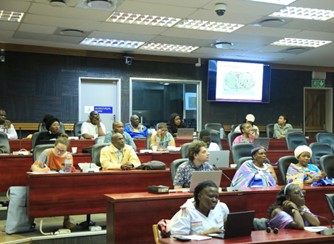
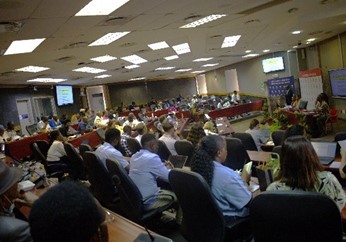
Participants
Afternoon sessions featured key discussions on environmental law and governance. Robert Krause (University of the Witwatersrand) chaired the session on Indigenous Knowledge Systems and Environmental Law, with presentations by Amelia Heyns on Natural Justice and Tumiso Kobolo (University of Venda). Khutso Delphus Maela (University of Venda) led the session on Extractivism and Justifiable Development, featuring contributions from Oliver Fuo (North-West University) and Adelaide Karomo (Nelson Mandela University). The day ended with a networking dinner at Khoroni Hotel, offering a relaxed space for reflection and connection.
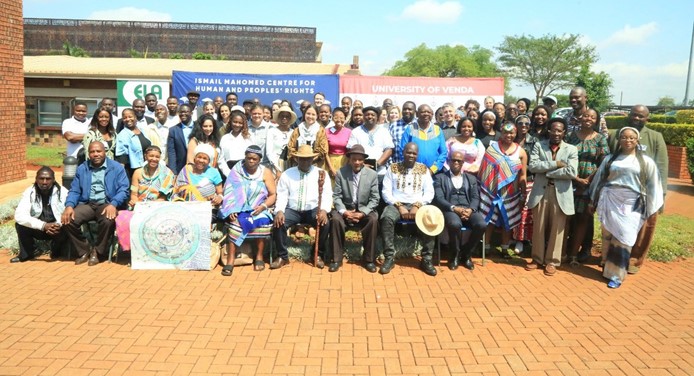
Annual conference group photo
Day 2 of the Conference featured an insightful keynote address from Megan Donald, of the Danish Institute for Human Rights. Her address explored the intersection of environmental degradation and economic, social and cultural rights, urging legal practitioners and policymakers to adopt inclusive, rights-based approaches to climate governance. Her insights sparked robust discussions throughout the day, reinforcing the urgency of aligning environmental law with human dignity and justice.
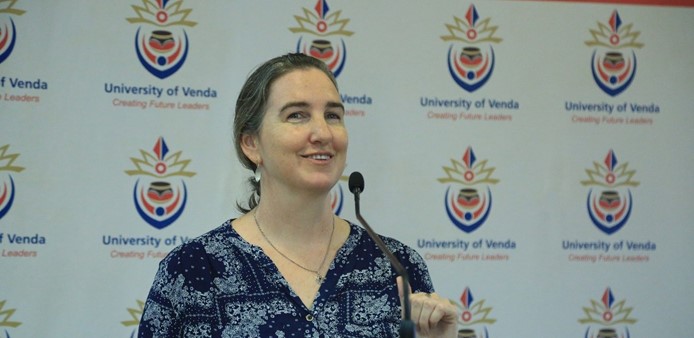
Megan Donald, Climate researcher, Danish Institute for Human Rights
The programme continued with presentations and dialogues that built on Megan’s themes, drawing attention to the lived realities of vulnerable communities and the role of law in advancing equitable climate action.
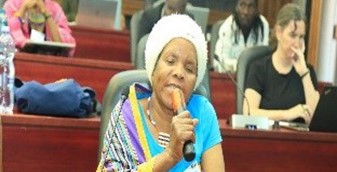
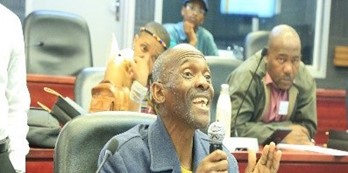
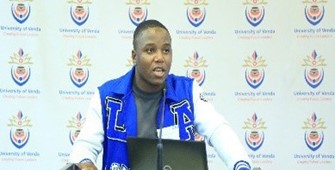
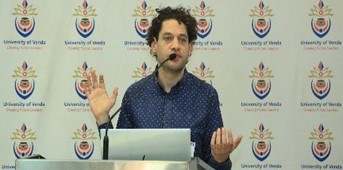
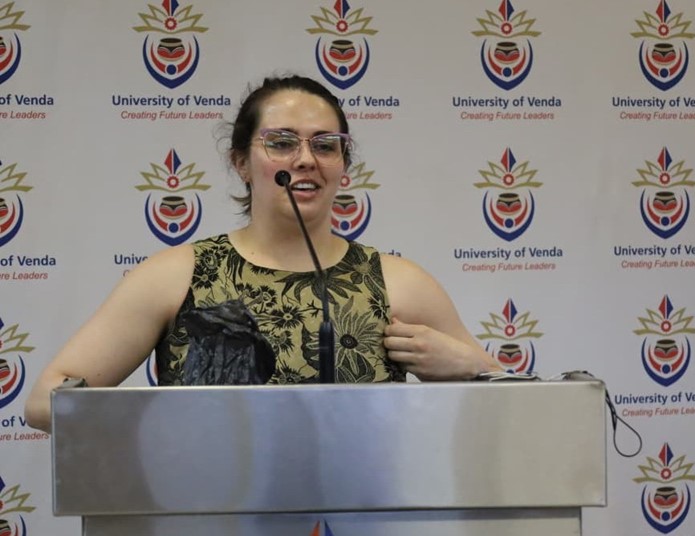 Nicola Irving, Vice Chairperson, Environmental Law Association of South Africa
Nicola Irving, Vice Chairperson, Environmental Law Association of South AfricaThe conference concluded with closing remarks by Nicola Irving, Vice Chairperson of the Environmental Law Association of South Africa, affirming the sector’s commitment to inclusive, rights-based environmental governance. She described how attending her first ELA conference opened the door to a vibrant community of environmental law practitioners and helped shape her focus on environmental justice and children’s rights. She encouraged junior attendees to stay engaged, affirming the value of connection, collaboration, and continued learning. She also acknowledged the effort of participants in making it to the conference and expressed appreciation for their time and intellectual contributions. Formal thanks were extended to Ismail Mahomed Centre, UNIVEN team for being a wonderful host.
Through the IMCHPR, UNIVEN continues to expand its footprint on the intersection of environmental law with human rights, positioning itself as a leading voice in advancing both environmental and human rights law in South Africa and beyond.
Issued by:
Department of Marketing, Branding & Communication University of Venda

ELA ANNUAL & STUDENT CONFERENCES 2025. The environment and Justifiable limits on development
Hosted by the Ismail Mahomed Centre for Human and People’s Rights, School of Law, University of Venda
Dates:
- 8 October – Student Conference
- 9-10 October – Annual Conference
- 11 October – ELA AGM; Excursion to the Nwanedi Resort
Theme
The environmental right in section 24 of the Constitution provides that ‘everyone has the right to an environment not harmful to health or well-being’. Further, it states that the environment is to be protected for the benefit of present and future generations ‘through reasonable legislative and other measures that…secure ecologically sustainable development and use of
natural resources while promoting justifiable social and economic development’. The right may be limited in terms of section 36 of the Constitution. But only in terms of a law of general application that imposes a limitation that is ‘reasonable and justifiable’.
Yet environmental rights violations are rampant. Harmful economic developments cause millions of deaths worldwide each year, including from waterand air pollution. Evidently, they violate not only
the right to an environment not harmful to health or well-being, but interrelated rights to life, dignity and equality, as well as the rights of the child, given children’s particular vulnerabilities. South African case law demonstrates that the government authorises developments such as new procurement of new coal-fired power without interrogating whether they are justifiable.
When is development justifiable?
Against the above background, our 2025 conferences will interrogate the relationship between the environment and limits on development, which must be justifiable. It provides a platform for engagement among activists, civil society, lawyers, judges, environmental assessment practitioners, government officials, and others in the environmental governance space. The overarching goal
is to enhance knowledge on the legal requirement to justify economic and social development given the constitutional imperative to secure ecologically sustainable development. This is a topic that courts and academic literature have not yet sufficiently explored. It is ripe for discussion among diverse state and non-state actors that want to understand the what, when, and how of
‘justifiable development’. In collaboration with the Ismail Mahomed Centre for Human and People’s Rights, School Law, University of Venda, we will unpack this topic.
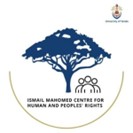
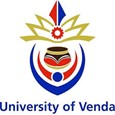
We will publish a call for abstracts and registration form soon
Please save the date and join us for insightful inputs from:
- leading, globally recognised environmental law academics.
- activists seeking to defend the environment in Limpopo, such as Living Limpopo and the Vhembe Biosphere Reserve.
- practising lawyers in the environmental law space.
- the broader scientific community focused on the relationship between development and the environment.
The ELA is committed to bringing together diverse voices in pursuit of the protection, promotion and fulfilment of the environmental right. Our conferences offer a rare opportunity to connect with a complex and growing community in the environmental governance space.
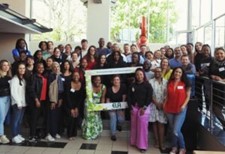
Conference highlights
For the first time the ELA is hosting its conferences in the Limpopo Province, in collaboration with the Ismail Mahomed Centre for Human and People’s Rights, School of Law, University of Venda. Our exciting collaboration draws attention to an often peripheralised, highly significant part of South Africa. Here are some facts about Limpopo:
- It is 125 754 km², a land area larger than many countries, including Portugal and Malawi.
- Its population is around 5 million people.
- It is home to some of South Africa’s most important biodiversity, including in the Mopani; Vhembe; Capricorn; Waterberg; Sekhukhune districts.
- The “Big Tree” or Sagole Baobab is located near Thohoyandou in Vendaland, Limpopo. It is a massive baobab tree considered the largest in South Africa, with a trunk diameter of 10.8 meters and a circumference of 32.89 meters.
- The Musina-Makhado Special Economic Zoneis planned in Limpopo, and is currently subject to a legal challenge given its proposed clearance of between 3868ha-8000ha of pristine land in Limpopo in preparation for
the development of a 3 300 MW coal-fired power station and other heavy industrial activities.

Excursion to Nwanedi Resort: 11 October
Our conferences showcase the complexity of Limpopo: its beauty and the benefits and risks of economic development. On 11 October, we will visit the Nwanedi Resort. This stunning resort is situated inside Nwanedi Nature Reserve, a protected area in the northern part of Limpopo. It is located about 20 km east of Tshipise and 35 km north of
Thohoyandou.
The Nwanedi Nature Reserve includes a part of the wooded foothills of the Soutpansberg Range. It is located in the centre of the majestic Venda Mountains in the northern parts of Limpopo. Further, varied landscapes, rich diversity of animals, and the awesome Nwanedi and Luphephe dams characterise this resort. It features a spectacular
waterfall, known as Tshihovhohovho Falls. The Nwanedi Nature
Reserve is in the Soutpansberg or “Tha-vhani ya muno” (mountain of salt) which is in the traditional area of the Venda people. And, it is rich in plant diversity with Yellowwood trees, twelve Acacia species, including Fever Trees, Giant Cabbage Trees, Proteas and ancient Tree Ferns.

Conference organising committee
The members of the conference organising committee are:
- Dr Melanie Murcott, Chairperson of the ELA, Associate Professor, UCT
- Prof. Ademola Oluborode Jegede, Limpopo Representative of the ELA, Director, Ismail Mahomed Centre for Human and Peoples’ Rights, School of Law, University of Venda
- Dr Nonhlanhla Ngcobo, Treasurer of the ELA, Lecturer, NWU
- Nicola Irving, Vice-Chairperson of the ELA, Attorney, Norton Rose Fulbright
- Nicola Irving, Vice-Chairperson of the ELA, Attorney, Norton Rose Fulbright
- Margot Slabbert, Social Media Manager of the ELA
- Saritha Marias, Secretariat of the ELA, Personal Assistant, Office of the Dean, NWU
- Cornelia Van Graan, Lecturer, Department of Public Law (Criminal Procedure), School of Law, University of Venda
Date
09 Oct 2025 - 11 Oct 2025
Time
All Day

Prof Ademola Jegede gives an introductory speech commemorating the National Human Rights Day 2025
In his introductory address, Professor Ademola Jegede addressed stakeholders during the Human Rights Day public lecture event hosted by the IMCHPR on 21st March 2025 at the University of Venda Conference Centre. In his address, he stated as follows:
Human Rights Day is a national day that is commemorated annually on 21 March to remind South
Africans about the sacrifices that accompanied the struggle for the attainment of democracy in South Africa. It is a day that holds significance not only for South Africa but the rest of Africa and, indeed, the world.
This is especially so in a season such as ours across the globe, where, truth be told, the state of human rights had never been more concerning, and its relevance had never been more contested. The reality speaks for itself; we do not need to light a candle to see the sun; it is apparent. From the rise of authoritarianism to populism and the spread of
disinformation, misinformation, and propaganda to the ongoing struggles against poverty and inequality, ego war and aggression, human rights are threatened in different spaces. Yet, the battle to fight for human rights in the face of human wrongs remains as crucial as ever.
Today, for the 2025 National Human Rights Day at the University of Venda,
a university known for its rich history, vibrant culture, and engaged scholarship, we gather to reflect on a topic that is an important and core component of the human rights compass. This topic is fundamental to our shared humanity: the right to education. The right to education should not just be some words on paper but must be the bedrock of a just and
equitable society, the foundation for building peaceful and prosperous communities.
Allow me to say this: education reduces poverty, decreases social inequalities, empowers women, and helps individuals reach their full potential. It also brings significant economic returns for a country and allows societies to achieve lasting peace and sustainable
development. Education is key to achieving all other human rights. But is the right to education in South Africa a hype, or is it a hope? Is it a myth, a mirage or indeed a right in substance? Should it be the national discourse, or a part of the national discourse or apart from it? I am pleased that while I am free to ask all these questions, I do not have
to answer them.
To do justice to this pivotal topic and the nagging questions it poses to South African national life, distinguished ladies and gentlemen, we have been lucky and, at the same time, privileged to find a perfect fit for the topic. In collaboration with our partners, the Ismail Mahomed Centre for Human and Peoples’ Rights has invited someone
to help draw this Leviathan with his intellectual hook.
Professor Tshepo Madlingozi is a Commissioner at the South African Human Rights Commission and is responsible for the following focal areas: anti-racism, education, and equality. He is also the Chairperson of the Commission’s Legal Committee. Before joining the SAHRC, he was the Centre for Applied
Legal Studies Director at the University of the Witwatersrand. He was actively involved in the work of various civil society organisations and initiatives. For thirteen years, from 2005 to 2018, Prof Madlingozi dedicated his efforts to the Khulumani Support Group, serving as the National Advocacy Coordinator and later as Chairperson, supporting the movement's
120,000 members composed of victims and survivors of apartheid. Furthermore, he was pivotal as Chief Panelist for the South African Human Rights Commission Enquiry into Racial Discrimination and other forms of Discrimination in Advertising from 2021 to 2022. He holds academic positions at the International Institute of Social Studies of Erasmus University
Rotterdam and the Vienna Master of Arts in Applied Human Rights
Distinguished ladies and gentlemen, it is an honour to present Prof Tshepo Madlingozi to you to speak to us on the topic titled: The right to education and its role in the resolution of the national question.
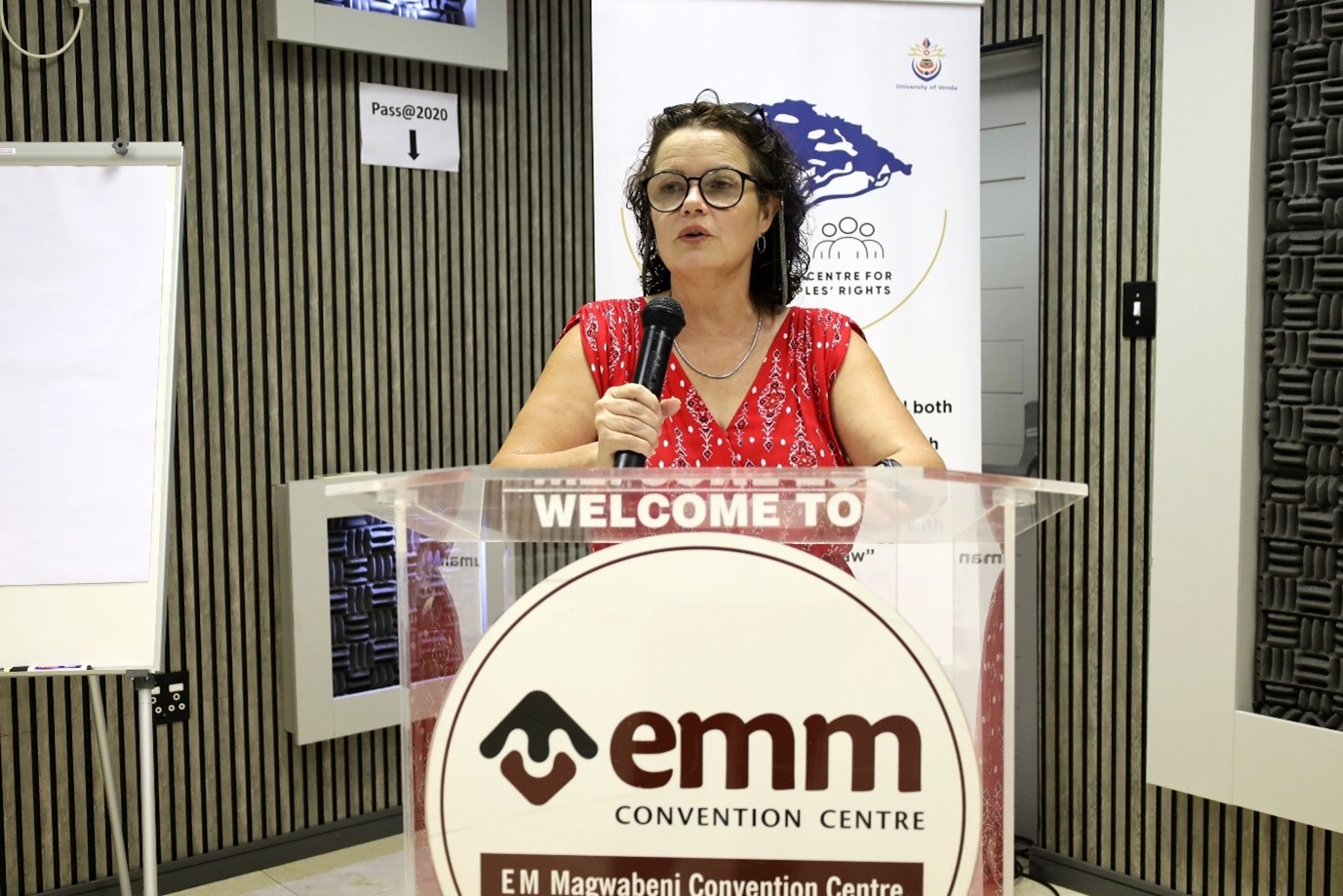
THE IMCHPR Charts Course for 2025 with Diverse Stakeholder Input
The Ismail Mahomed Centre for Human and People's Rights (IMCHPR) at the University of Venda recently convened a significant strategic planning meeting on January 20, 2025, at the 2 Ten Hotel in Sibasa. The productive session brought together various stakeholders committed to advancing human rights, including representatives from different departments within the
University of Venda (Faculty of Management Commerce and Law, Directorate of Research & Innovation, Human Resources, Risk Management, School of Law, Student Representative Council) and external partners from diverse sectors in South Africa, such as JAMMA International the the South African Human Rights Commission, the
Commission for Gender Equality, the Centre for Human Rights at the University of Pretoria and the Dullah Omar Institute at the University of the Western Cape as well as the as the University of South Africa (UNISA).
The primary focus of the gathering was to review the Centre's impact and achievements
throughout 2024, using those insights to shape a robust and effective operational plan for the current year. The collaborative atmosphere fostered rich discussions aimed at enhancing the IMCHPR's contribution to a strong human rights culture.
Professor Ademola Oluborode Jegede, the Director of the IMCHPR, emphasized the importance of collective wisdom,
highlighting that the diverse perspectives present from across the University and its external partners would be instrumental in shaping a more impactful and relevant operational plan for 2025.
Key Recommendations Emerging from the Strategic Meeting:
- Enhance Online Presence: Prioritize a significant upgrade of the Centre's website to make it more informative, interactive, and engaging for a wider audience.
- Amplify Public Engagement: Proactively target opinion pieces in local and national newspapers to raise the Centre's profile and contribute to public discourse on human rights issues.
- Strategic Funding Pursuit: Regularly explore funding opportunities on platforms like the National Research Foundation (NRF) and cultivate ready-to-submit proposals for potential donors, including international human rights communities.
- Deepen Institutional and External Relationships: Establish more robust collaborations within the University and with external stakeholders to broaden the Centre's reach and impact.
- Focus Community Engagement: Embark on more targeted community engagement initiatives aligned with the Centre's specific areas of expertise.
- Boost Student Involvement: Develop clear strategies to actively engage University students in the Centre's mandate, potentially through dedicated programs and opportunities
- Explore a Donation Unit: Consider establishing a unit for donations to support students facing financial hardships, as raised by the Student Representative Council.
- Strengthen Research Support: Implement strategies to better assist postgraduate students with their research endeavors within the Centre's focus areas.
The strategic planning meeting concluded with a clear sense of direction and a renewed commitment from all participating organizations to work collaboratively towards strengthening the IMCHPR's role as a vital hub for human rights advocacy, research, and education at the University of Venda and beyond.
What's Next?
The outcomes and key recommendations from this important meeting will now guide the development and implementation of the IMCHPR's activities for 2025. Stay tuned to our website for updates on our upcoming programs and initiatives as we work towards a more vibrant and impactful human rights culture.

THE IMCHPR Joins The South African Human Rights Commission In A Dialogue On Mining The Impact Of Mining Activities On Human Rights & The Protective Role Of Traditional Leaders
Prof. Ademola Jegede, Director of the Ismail Mahomed Centre for Human and Peoples' Rights (IMCHPR), gave a presentation titled The Environmental and Socio-economic Impact of Mining Activities on Human Rights in Indigenous and Traditional Communities. He began by introducing the centre's mandate and activities.
He drew a crucial distinction between Indigenous and local people, underscoring the unique rights afforded to Indigenous populations. Prof Jegede then outlined his extensive research on the interface between environmental law and human rights in South Africa. He observed that mineral resources are predominantly located in communities
inhabited by Indigenous and local populations, and cautioned against perpetuating a "colonial mentality" that denies Indigenous land ownership. He noted that the global drive to extract minerals and fossil fuels is intensifying the adverse effects on the livelihoods of local communities. Prof Jegede posited that the interests of mining
companies and local communities are, in fact, compatible with the development of the economy through the extraction of resources. While mining companies pursue business objectives, localcommunities require development, which mining operations can facilitate. He stressed the imperative for mineral extraction to benefit the communities
that bear the brunt of its impacts.
Prof Jegede critiqued the prevailing mining model, which he characterized as prioritizing extractors' benefits over the suffering local communities endured. He advocated for a rigorous intellectual interrogation of this model, emphasizing that extracting resources from underdeveloped Africa has
significantly fueled European development. The concrete realities faced by local communities, such as air, water, and noise pollution, were highlighted to illustrate the negative impacts of mining. He proposed adopting a standardized pre-mining engagement process, enabling communities to negotiate their developmental needs and expectations.
He further pointed out that extractive activities can undermine access to lands and natural resources vital to their physical well-being, and lead to the loss of sacred sites.
Turning to the issue of illegal mining, he questioned who the actual beneficiaries are, and criticized the vagary of laws that criminalize non-conforming economic activities. He cited the criminalization of basic environmental activities, such as the cutting and use of firewood, in particular African regions, despite the dire circumstances of
these communities. He then explored the broad spectrum of rights implicated by mining activities, including fundamental rights such as the right to life, health, speech, movement, assembly, and participation. To operationalize his proposal for a standardized engagement process, Jegede recommended adopting and implementing a community-based protocol,
ensuring participation, justice, and benefits for local communities. He added to a previous model of solutions that he had proposed to the commission during an earlier inquiry on mining activities.

The IMCHPR presents submissions at the SAHRC Enquiry into the violations of human rights of mining communities in Limpopo Province.
Following the signing of the MOU between Univen and the South African Human Rights Commission (SAHRC) on the 21st of August 2023, and previous successful engagements between the two entities, the SAHRC invited the University of Venda through the Ismail Mahomed Centre for Human and People’s Rights (IMCHPR) was invited to an inquiry on the impact of mining activities on human the rights of mining communities in Limpopo. The Ismail Mahomed Centre was requested to make submissions on the impact of mining activities on human rights in Limpopo. This event spanned three days (25 – 27 June 2024).
Mr Ramabaga Thuso and Team (Mr Magau Londani and Innocent) sworn in by the commissioner under oath made contributions to the inquiry, presenting research data on the impact of mining activities on human rights. The presentation was strongly based on the legal framework protecting human rights in at the international, regional and domestic level, emphasising the ample legal protection for the aggrieved communities. The UNDHR, African Charter on Human and Peoples Rights, South African Constitution and The NEMA Act were among many other cited sources. The suffering of local mining communities and the pleasures that the public enjoy on regular basis was highlighted, the unsafe and uncomfortable mining environment was addressed and that there is a need to protect local communities. Doctrinal references were made from case studies in Mpumalanga and Vhembe District. There was scholarly evidence showing the plight of local communities facing alarming levels of water and air pollution resulting from mining activities. There were high reports of water contamination in areas that generally lack water, dust and smoke (gases) in the air that made it difficult for local communities to breathe. This scholarly evidence was weighed against the universally coveted rights to a clean and healthy environment. There was also evidence of a gap in the implementation of Social and Labour plans by mining companies in communities. Illegal mining was also identified as a key issue in the human rights and mining engagements considering the risks associated. The IMCHPR offered solutions to the audience based on a new model of responsibility and accountability between mining companies and communities, stakeholders were encouraged to communicate with the University for discussions in line with the solutions. The Submissions from the team were heavily scrutinised by the panel for clarification and confirmation and were well received by the audience.

Ismail Mahomed Centre For Human And Peoples’ Rights Report On The Commemoration Of International Widow’s Day At Mhinga Community
On the 21st of June 2024, the Ismail Mahomed Centre for Human and People’s Rights supported by Dr Crystal Mokoena and Ms Zama Mopai of the Department of Public Law marked the 2024 International Widows Day at the Mhinga Community. The event also coincided with the visit of Law Clinic to the community. At the event, participants were educated and engaged on the plight of widows and issues related to widows’ rights: widowhood rites, cultural barriers, and inheritance practices. The meeting also enlightened the community about the legal and non-legal avenues available to them.

The IMCHPR Hosts a Roundtable discussion in collaboration with JAMMA International to discuss the sustainable use of wildlife as it impacts the rights of IPLP in southern Africa.
On the 17th and 18th of October 2023, the Ismail Mahomed Centre for Human and Peoples’ Rights of the Faculty of Management Commerce and Law, University of Venda, in collaboration with JAMMA International, hosted a Round Table discussion. The event brought together various stakeholders, including the Indigenous Peoples and Local Populations (IPLP), government agencies, conservation organizations, and law enforcement agencies, to engage with the topical issues around the sustainable use of wildlife as it impacts the rights of IPLP in southern Africa. In particular, there were representatives from the Makuya community, Makuleke community, University of Venda, Jamma International, Peace Parks Foundation, Elsie Vaalbooi Foundation, Khomani San Traditional Leader, African Community Conservationists-NPO, G Chabalala Incorporated, Tourism Agencies, and South African Police Services (SAPS).
The collaborative event was a major platform of awareness creation that generated gaps in knowledge and practice for timely and future interventions. By bringing together diverse stakeholders, the event contributes to the identification of gaps, possible interventions for the challenges posed and the development of sustainable and equitable approaches to wildlife conservation and management in Southern Africa. Below are the highlights of the events.

Ismail Mahomed Centre for Human and Peoples’ Rights participated at SAHRC Stakeholders’ meetings
On the 5th and the 7th of September 2023, the Ismail Mahomed centre for Human and Peoples’ Rights was invited by the South African Human Rights Commission (SAHRC) to a stakeholder meeting about the impact of tribalism in the Vhembe District. The stakeholders included traditional leaders, religious leaders, Vhembe municipality and chapter 9 institutions. Long, robust and comprehensive presentations and discussions were held by the various stakeholders who attended on the different roles each institution can play to bring the tribalism conundrum to an end. There was a consensus among all speakers that tribalism in the South African context results from the legacy of apartheid, the forced removals of people, and geographic separation. It was concluded that the legacy of apartheid led to an ununified province district. Various speakers stated that before apartheid, African people in the Vhembe district, including the Venda and Tsonga people, co-existed and lived harmoniously in unity, embracing each other’s heritage and culture. It was also agreed that tribalism and racism are relative concepts and that if tribalism is not adequately dealt with, communities may face deeper problems. It was emphasised that traditional leadership as well as religious houses are critical institutions that will play a critical role in fostering unity and building social cohesion in communities. Contributions from the Ismail Mahomed Centre for Human and Peoples’ Rights were on the role of institutions of higher learning in ending tribalism and building social cohesion. All stakeholders cordially received submissions from the centre, showing commitment to ending tribalism within the district and fostering social cohesion. The Ismail Mahomed Centre is committed to building and supporting the cause of human rights observation and respect. The key take away is that African people must respect and embrace each other regardless of culture, race, skin colour, gender and religion because we are first human before these statuses!
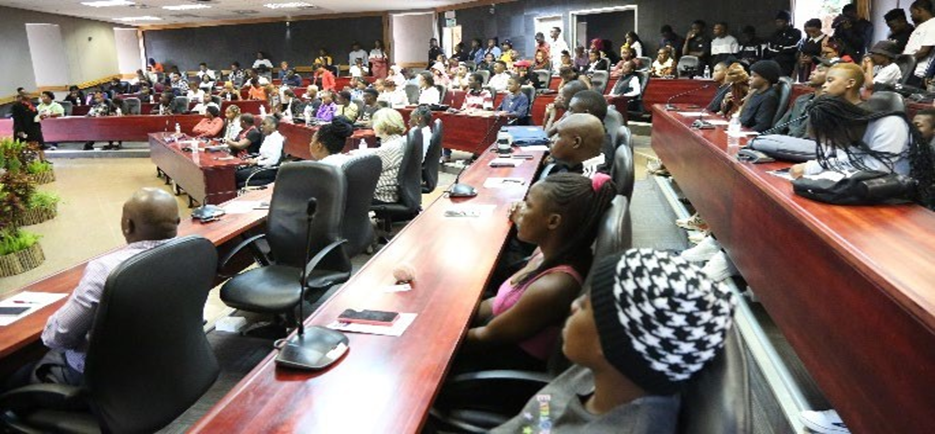
Ismail Mahomed Centre for Human and Peoples Rights (IMCHPR) commemorates the International Women’s Day themed: innovation and technology for gender equality
The International Women’s Day originates from the women’s rights movement and has since become a global call to celebrate the social, economic, cultural, and political achievements of women. This is in recognition that there is more work to be done on advancing women’s rights to achieve substantive equality and a reminder that women are the focal point of change. It is for these reasons that the Ismail Mahomed Centre for Human and Peoples Rights (IMCHPR) of the Faculty of Management, Commerce and Law, University of Venda organised a symposium to mark the 2023 International Women’s Day under the theme ‘innovation and technology for gender equality’. The event took place at the University’s Research Conference Centre and was attended by staff, students, and stakeholders outside the University.

IMCHPR mandate as the focus of MOU between UNIVEN and SAHRC
On 21 August 2023, the University of Venda (UNIVEN) and the South African Human Rights Commission (SAHRC) established a formal working relationship. This was done through a memorandum of understanding (MOU) signed and celebrated. As an institution within the University of Venda, the Ismail Mahomed Centre for Human and Peoples’ Rights (IMCHPR) is the administrative secretariat for the implementation of the MOU. The MOU aims to develop a framework for cooperation and effective implementation of joint activities around the promotion of human rights within the Limpopo province. This will be achieved through awareness campaigns, research publications, and advocacy. The purpose is to promote rights and protect individuals, especially those within local communities facing human rights violations and social injustices.


IMCHPR is the secretariat for implementing UNIVEN/ JAMMA International MOU
On 21 June 2023, the University of Venda and JAMMA International signed a memorandum of understanding. Ismail Mahomed Centre for Human and Peoples’ Rights is the secretariat for the implementation of the MOU. The areas of collaborations embodied in the MOU include human rights and social justice advocacy and research with a focus on the sustainable use and conservation of natural resources by local communities and indigenous populations. In developing the road map for the implementation of the MOU, a roundtable was planned by Ismail Mahomed Centre for Human and Peoples’ Rights and JAMMA International as well as other stakeholders for the 17th and 18th on the global biodiversity framework, target 5 which speaks to the sustainable use of wildlife and the rights of Indigenous peoples and local communities.
